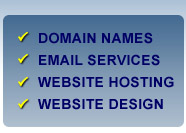SEO
Search Engine Optimization (SEO) is an umbrella term for making your website easier to find on the ever-expanding internet. For some time, many people have considered it unneccesary, or a myth, or simply a way for webhosts to upsell a bogus service. In reality, it is simply a necessary evil, and a complicated one at that.
You may have a website, but now internet users need to find it.
But what is it?
SEO is the method of increasing relevent traffic to your website from search engines. This is done on a variety of levels; improving the performance of your website itself and making it 'search engine friendly', keyword optimization, increasing the number of links to your site (linkbuilding), and finally, paid marketing programs with the search engines (notably Google and Yahoo!) themselves. In summary, think of it as advertising.
But do I need it?
The most truthful answer is No, it is not necessary, much like advertising in your phonebook's yellowpages is not necessary for your business. But is it recommended? If the goal of your website is to increase exposure, and therefore revenue, then yes, it is highly recommended, for the same reasons you would advertise in your yellowpages. In fact, since more and more people are beginning their business searches on the internet, when they used to reach for the yellowpages, SEO is becoming increasingly more valuable to business owners that have even a limited online presence. No longer is it important whether you conduct online business transactions (E-Commerce) or not. Even if you have a simple informational website that is oriented to drive potential customers to you, then SEO will improve those visits tremendously.
Is it expensive?
SEO costs vary, depending on the needs of the customer. Basic site optimization should be a one-time fee, and part of the website design package. Over time, changes may need to be made to compensate for evolving search engine technologies, and changes in your business' structure. These costs may be negligable if the original design was built with SEO in mind. Other websites may require significant redesign to make them search engine friendly. Basically, if your website was designed around SEO, it might cost you less than $100 to optimize it. If the site requires radical design work, you may end up spending thousands.
Search Engine Advertising rates will vary as well, based on your marketing strategies and monthly advertising budget. Although you can setup monthly advertising plans with both Google and Yahoo! for $50.00 per month each, the results will be minimal. Minimum recommended advertising plans are $100 per month for each of these two primary search engines, and results will vary based on whether your marketing target is local (city), regional (state), national, or international.
Keyword Analysis
A common question we get in regards to SEO is what is meant by 'Keywords'. It is a confusing subject since the practice of keyword usage has changed in the past five years. Keywords used to refer to the META-tag keywords of a particular website. This was a list of words and terms that applied to the purpose of the website. They were embedded in the code of the website, not readily visible to human visitors. It could however be seen and read by the search engines, who would use those terms when matching search inquiries. Although the practice of setting these META-keywords is still common, modern search engines ignore them. Google, Yahoo!, and most of the other major search engines look for keyword density in the text of the website itself, primarily the main entry page. These search engines regularly read the text on your website, analyze it, categorize it, and then uses that information for search inquiries.
Now, let us answer the next common question once people grasp the modern keyword process: No, filling your main page up with repeated text focusing on a few keywords (any regular internet user has come across these kinds of websites by now) will not make your site more popular. In fact, doing such can penalize the results. In the case of Google, who uses a pageranking system, over-saturation of keywords on a site will lower the pagerank score. Their goal, obviously, is to make things fair for everyone. The popularity and availability of a website should be based on natural content, and normal advertising programs.
What keywords should I choose?
The simplest answer is: 'If you were a potential customer, what words would you type in a search engine to find your business?'. Obvious terms like the business name, the particular industry you work in (ie: 'software designer', 'antique clocks', or 'drycleaner'), the region you work in, and particular industry terms that relate to your business. These terms would then be used in multiple ways. First and foremost would be in the text of your website...typically the entry page provides an overview of your company and your services, so this would be appropriate. These keywords would also be used as a basis in your paid marketing program on the search engines.
Can I do SEO for my website by myself?
Of course you can, assuming you had the time and patience to learn all the aspects of SEO, and can maintain constant vigilance of your marketing campaigns. As a business owner, however, it is assumed that you have better things to do with your already limited time.
Depending on your needs however, the ROI (return on investment) of having an outside source conduct your SEO program for you is more advantageous. Leave it to people that thoroughly understand the many processes, and can be available to make the frequent neccessary adjustments to the campaign to improve it's efficiency. These companies are focused on improving results, which translates to more visitors to your website.
Other Resources
- SEOmoz.org Articles - A website dedicated to explaining SEO to the public, and keeping up with modern trends and practices.
- RocWorx SEO Services - Our SEO Services page, with information on what RocWorx can do for you.




